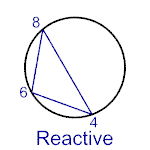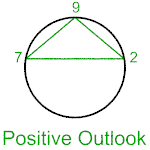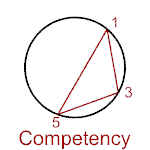The Harmonic Approaches
The Harmonic approaches describe how each type handles conflict, adversity, and situations in which our needs are not met.
There are three Harmonic approaches:
In practice, we have all three harmonic approaches in us in varying degrees. However, we tend to have a dominant harmonic approach - the one associated with our type. Of particular interest is the combination of harmonic approaches at work when people are resolving conflicts.
The Reactive Approach (Types 4,6,8)

People whose dominant Harmonic approach is the reactive approach are emotionally reactive under stress. They tend to work themselves up when a problem happens and have a hard time containing their feelings. This emotional intensity allows them to feel the "realness" of the problem, even if it is a relatively small one. Venting their frustration allows them to move on to dealing with the issue. Wanting others to see the realness of the problem, they expect others to react emotionally. Such a reaction would confirm that others agree that indeed this is a big deal. If others don't respond in the way the Reactive approach types want, they may become even more frustrated and emotional.
The Reactive approach is not naturally trusting of others. They have strong opinions and tastes and want to know where others stand.
Their desire for a strong emotional response from others may be a test of trust.
Reactivity of Fours
Fours can get into conflicts by being overly moody, temperamental and self-absorbed. Fours tend to have (over-) dramatic reactions to problems. They need to process and internalize their experiences. Identity and emotional reactions are highly intertwined in a Four. Fours tend to withdraw into their imagination, where problems often escalate into feelings of despair and hopelessness. Fours want to be emotionally open with and trust others, but more so with very close people. Their emotional guard is down so they can let others in.
Reactivity of Sixes
Sixes can get into conflict by being too pessimistic, suspicious, and doubtful. Sixes tend to be very anxious people. They are always on the watch for dangers and threats. When conflicts or threats occur, their anxiety comes out, often as long rants, hysterical overreactions, and feelings of inferiority. Sixes want to trust others (and others often put their faith in Sixes), but remain wary of problems. Sometimes they let their guard down (when within the confines of the authority/belief). Other times, they keep their guard up to ensure that others do not take advantage of them.
Reactivity of Eights
Eights can get into conflict by being too willful, defiant and confrontational. Eights tend to not censor their own impulses or emotional reactions. Eights want to feel the realness of conflict to give themselves a stronger sense of being. When conflicts occur, Eights are very quick to challenge and confront them. Eights keep their guard up all the time and want to minimize their dependence on (and trust in) others. They do not want others to see their vulnerable side.
The Positive Outlook Approach (Types 2,7,9)

People whose dominant Harmonic approach is the Positive Outlook approach are generally optimistic and tend to avoid negative thoughts or situations. Under stress, they seek to avoid the problem, distract themselves with something else, or minimize the problem. These types want to feel good and want others around them feel good. They would rather have everyone happy (including themselves) than to deal with problems or negativity (especially in themselves). Unfortunately this approach can lead them to deny the existence of their problems and therefore delay addressing them.
These types also have issues with finding a balance between meeting their own needs and meeting the needs of others.
Positive Outlook of Twos
Twos can get into conflicts by being too clingy, worried, and self-important. Twos tend to focus on their own positive qualities, while repressing their own negative thoughts or feelings. Twos believe that they are good and that their good intentions will win them positive approval from others. What others think of Twos is very important to Twos. As a result, Twos are always looking for ways to meet the needs of others and finding ways to please others. Twos often reject their own needs in favour of fulfilling the needs of others.
Positive Outlook of Sevens
Sevens can get into conflicts by being impatient, irresponsible, and excessive. Sevens tend to focus on their positive expectations for satisfaction and fulfillment. Sevens are in fact fleeing from a threatening internal world and seeking security in the external world. If Sevens slow down, their minds may be drawn into the inner world of grief, sadness, and disappointment. Their quick minds avoid dealing with conflict and problems through distraction and constant activity. Sevens do not typically internalize their experiences; they remain somewhat unattached to people and things. In conflict, Sevens can quickly discard things and cancel commitments (i.e., the needs of others) without feelings of regret. It is easier to move on to happier things than to stay with things that depress. Sevens tend to reject the needs of others in favour of fulfilling their own.
Positive Outlook of Nines
Nines can get into conflicts by being too complacent, inattentive, and stubborn. Nines tend to focus on their positive and harmonious relationships with their environment. Nines have a difficult time dealing with conflict or change because it disrupts their peace and stability. Nines, therefore, try to deny or avoid these problems by strengthening their attachment to the status quo. These problems will take care of themselves, so why bother dealing with them. Nines focus on the needs of others, often accommodating to others. Nines try to balance the needs of others with their own needs of autonomy.
The Competency Approach (Types 1,3,5)

People whose dominant Harmonic approach is the Competency approach try solving problems in an objective, unemotional manner. Unlike people of the reactive approach, they don't get worked up when problems happen, they remain cool and emotionally detached from them.
When confronted by a problem, these types have issues on working within a framework or structure.
Competency of Ones
Ones can get into conflicts by being too impatient, rigid, and critical. Ones focus on solving problems by doing what's right. Ones strongly believe that by following the rules, their faith, or their principles they will come to a just and fair solution. Ones feel that they must put their own wants (and feelings) aside in order to remain objective (and autonomous from influence). Ones may appear cold to others and that they don't take into account the feelings of others.
Competency of Threes
Threes can get into conflicts by being too competitive, insincere, and boastful. Threes focus on being efficient and meeting their goals. When confronted with problems, they can easily set aside their own feelings and focus on the task at hand. In general, Threes want to follow existing structures. However, Threes are pragmatists that will cut corners to realize their goals.
Competency of Fives
Fives can get into conflicts by being too detached, isolated, and provocative. Fives naturally detach themselves emotionally from the world to be objective. They believe that they have the mental resources to deal with problems. In conflict, Fives will want to withdraw and will think for a while before coming back with a solution, often to the irritation of others. Fives feel that they can solve things by themselves, without relying on others. They may come back with highly original ideas (thinking outside the box). On the other hand, they may waste their time reinventing the wheel.


